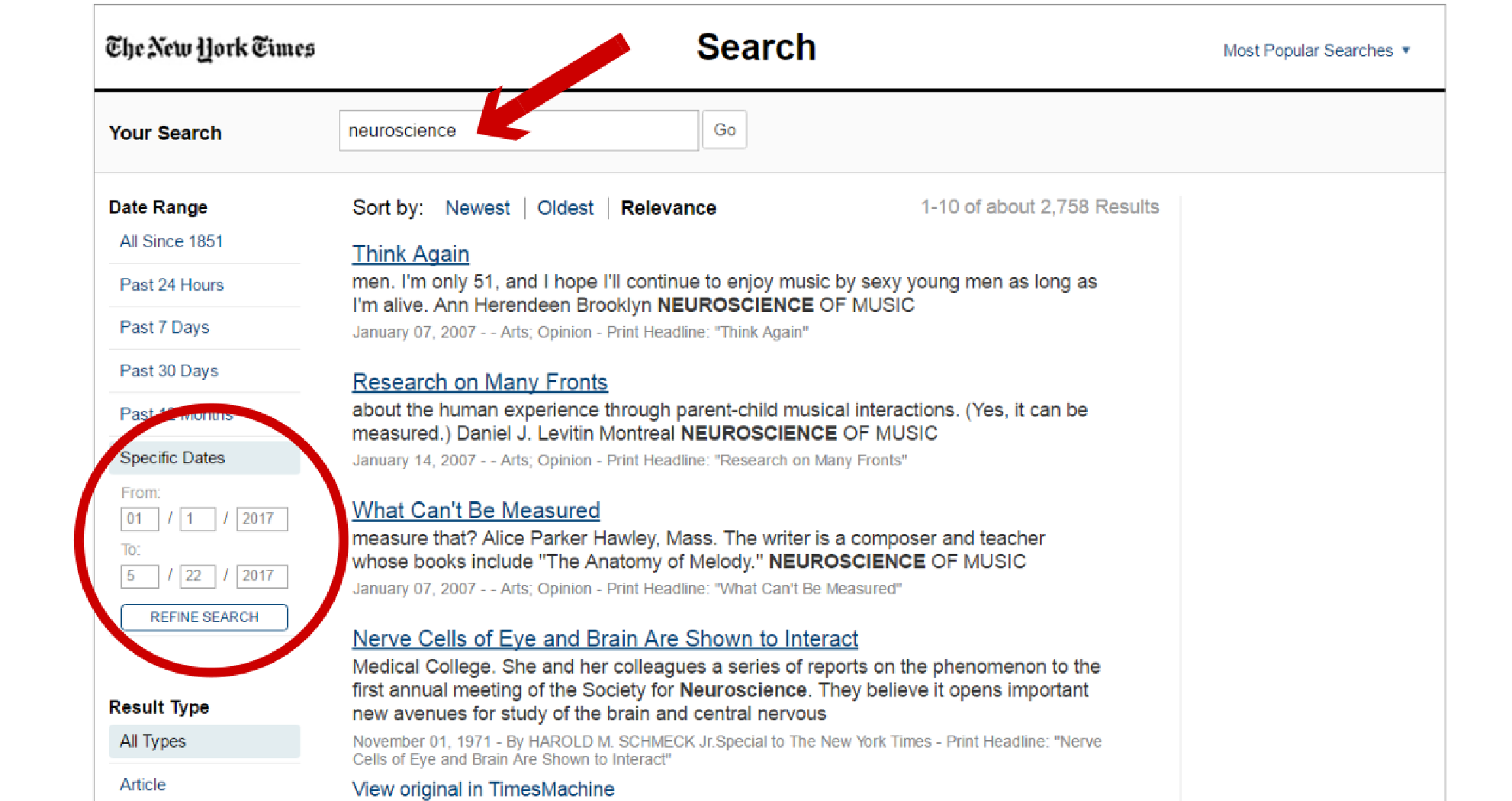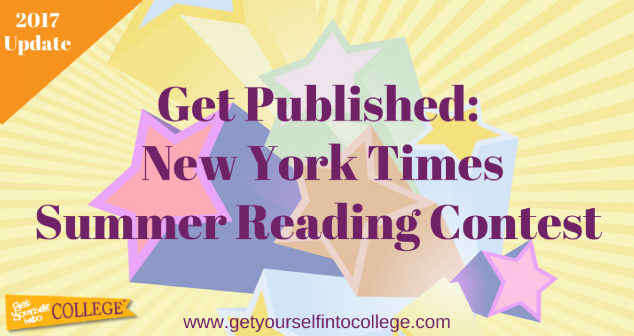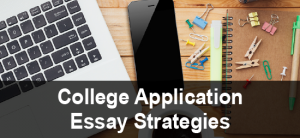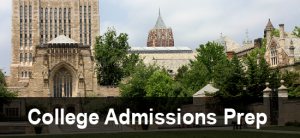The New York Times Summer Reading Contest provides you with a great opportunity to learn more about issues you find intriguing, discover new areas of interest, and even gain a competitive edge in the college admissions process.
EIGHTH ANNUAL NEW YORK TIMES SUMMER READING CONTEST
Basic things you need to know about the contest:
- For summer 2017, the contest runs from June 16th – August 25th.
- You answer two simple questions: “What interested you most in The Times this week? Why?” (These same questions are posted every Friday for the duration of the contest.) Your response can be a maximum of 1,500 characters (around 250-300 words).
- Every Tuesday, winners from the previous week are announced and their responses published.
- “Anyone 13 to 19 years old from anywhere in the world” can participate.
- You’re allowed to focus on anything The New York Times published in 2017, “including videos, graphics, slide shows and podcasts.”
- You can only submit one response per week.
CLICK HERE to get all the rules and details.
HOW SHOULD YOU APPROACH THE READING CONTEST?
Don’t enter the contest just because you want to win and be able to mention this accomplishment in your college application. Use the contest to advance your knowledge of topics that already interest you or discover new things. This way, even if you don’t win, the experience will be valuable.
Option #1: Use the contest to explore subjects, issues, or questions that you already find intriguing.
In junior high and high school, classes tend to be focused on helping you establish a very broad understanding of subjects. However, I encourage my students to develop more advanced and specific knowledge of things that interest them.
Let’s consider an example.
Lots of high school students tell me that they’re interested in neuroscience and want to study it in college. Some of them have only learned about neuroscience in their science classes while others have also studied it through their involvement in Science Olympiad and Brain Bee. These are great ways to start building up your knowledge base, but they mostly involve absorbing facts.
Often my students will deepen their knowledge by participating in a summer research program (usually in the summer between 11th and 12th grade) like Boston University’s RISE (Research in Science and Engineering) program, where they get to spend six weeks conducting research “under the guidance of a faculty member, postdoctoral fellow, or graduate student mentor” for 40 hours a week. As BU points out, some “research interns submit their work to national science fair contests such as the Siemens Competition and the Intel Science Talent Search.”
But. . . .
What if there aren’t many extracurricular opportunities for you to explore your interests?
What if you can’t participate in one of these summer programs?
DON’T DESPAIR!
DON’T GIVE UP!
I always tell students in this situation to be creative in terms of how they take action on their interests.
Participating in the New York Times Summer Reading Contest is one of these creative approaches. Poke around inside the Times and find pieces that describe interesting work in the field.
Let’s say that right now all you know is that you’re fascinated by the brain. Search “neuroscience” or “the brain” and make sure you limit the search to 2017. In the following image, I show you how to limit your search.

Start clicking on some of the results.
You don’t have to read things the way you do for school. Just search and skim until you find something that captures your attention. Then dig in and read, look, and/or listen.
Once you start exploring inside the Times, you might find more specific things about neuroscience that interest you.
Maybe you’ll stumble across Jess Bidgood’s “How to Get the Brain to Like Art” and suddenly realize there’s a way for you to bring together your interests in neuroscience and art. Or maybe you’ll discover Caleb Carr’s review of The Brain Defense: Murder in Manhattan and the Dawn of Neuroscience in America’s Courtrooms, get intrigued by legal applications of neuroscience, and decide to read the book.
But wait. . .
How can this help you in terms of college admissions?
After all, submitting 250-300 word responses to pieces in the New York Times (see below for tips on how to structure your responses) isn’t the same as participating in an advanced summer research program.
Nevertheless, it counts.
Advancing your knowledge in these ways can make a big difference when you’re writing your supplemental essays for colleges. Let’s consider the University of Pennsylvania’s supplement:
“The Admissions Committee would like to learn why you are a good fit for your undergraduate school choice (College of Arts and Sciences, School of Nursing, The Wharton School, or Penn Engineering). Please tell us about specific academic, service, and/or research opportunities at the University of Pennsylvania that resonate with your background, interests and goals.”
To write a compelling essay in response to this prompt you have to be able to talk very specifically about your intellectual experiences (your “background” and “interests”) and then connect them to the resources at the University of Pennsylvania. You don’t want to be broad or vague.
In your supplemental essay, you could talk about how you initially got interested in neuroscience and how you advanced that interest through your reading of the New York Times and participation in the Summer Reading Contest. You could even mention which pieces in the Times you read and describe what you wrote about them for the contest. If there are a lack of opportunities in your community, you could refer to this fact and use your description to demonstrate your ingenuity in terms of pursuing your interests. Then, of course, you’d want to link your intellectual path to the opportunities at the University of Pennsylvania.
CLICK HERE to read my article on supplemental essays. CLICK HERE to read my article on how Coursera and edX classes can be useful in the college admissions process. CLICK HERE to read my article on Yale alumni interviewer reports; it will help you understand how important it is to be able to talk about your interests and how you’ve explored them.
Option #2: Use the contest to discover and explore new topics.
Sometimes students come to me with only a fuzzy sense of what interests them.
That’s totally okay.
You don’t actually have to know exactly what you want to study in college. (There are some exceptions to this claim, but I’m not going to get into them here.)
Janet Lavin Rapelye, the dean of admission at Princeton, points out that “about 70 percent of our students graduate in a major different from the one they indicated on their admission application. We think this is exactly the right approach. We expect that students will explore their intellectual interests, and we want them to follow their passions, wherever they may lead them.”
What is important is that you are an explorer.
You’re not going to discover your intellectual interests by just sitting around. Ideas aren’t going to magically drop into your mind. 🙂
The New York Times Summer Reading Contest can help you start your exploration.
Go to the home page and click on “Sections” and the little arrows to see more specific options within each section. Just start poking around and exploring whatever it is that seems intriguing to you.You don’t have to choose something serious or academic.
You might want to check out The Daily 360 (short videos), The Daily (short podcasts featuring the story behind the stories), Times Documentaries, the Arts section, or the Science section.
Even if you’re applying “undecided” to schools, I recommend talking about a few subjects or issues that excite you and how you’ve explored them. Your process of reading, listening to, watching The Times and contributing to the Summer Reading Contest is definitely something you can write about in your essays and talk about in your alumni interviews.
TIPS FOR WRITING YOUR
RESPONSES FOR THE CONTEST
The Learning Network points out that “the best pieces year after year make both personal connections to the news and go beyond the personal to discuss broader questions and ideas that a piece raises.”
One thing that I really love about this contest is that it encourages you to enter into dialogue with authors and the issues they address. You’re not just writing an academic essay where you have to quote experts. Your voice and your personal connection to the issues raised in the piece are just as important. Plus, you’re challenged to connect your own perspective and the author’s to a broader context.
My #1 piece of advice is to read the entries of previous winners.
Study how they structured their responses.
- Do they ever write things like this: “What I found most interesting in The Times this week is_______”?
- How do they convey their interest?
- How do they situate their specific ideas within a broader context?
- What do you like about their writing style?
You might want to read Claire McClannan’s entry on “The World’s Disappearing Sand.” I love the tone of her contribution as well as her introduction: “Sand. The most boring thing you never thought about. But as it turns out, our cities depend on it, and we’re running out.” Just FYI, you can definitely start your Common Application essay in this kind of terse, surprising way. This type of introduction is much more compelling than the traditional opening paragraphs you have to write for your academic essays.
Gabe S.’s entry on “How the Government Supports Your Junk Food Habit” also has a great introduction: “Enter the twenty-first century: Greek yogurt, quinoa, juice cleanses, and Fitbits. Eating healthier and making the right choices at mealtime have gained popularity. And food companies have evolved to meet the demands of the customers who want all-natural, organic, GMO-free products.” I also like how he describes the way the article opened his eyes to how “agricultural policies had grown so out of line with the health-related needs of the country.”
GO FOR IT!
I hope you take advantage of this opportunity. If you do, let me know. I love cheering on my students and readers!
The Learning Network emphasizes that it doesn’t matter “what you choose or whether you loved or hated it.” What they care “about is what you have to say about why you picked it.”
WAYS TO WORK WITH DR. BERNSTEIN!
Click here to learn how to schedule a private consultation with Dr. Bernstein.
Click here to learn more about Dr. Bernstein’s ongoing private college preparation and college admissions support.
Click here to learn about the online Get Yourself Into College® program.
Blog post image used: ©Katerina Havelkova/bigstock.com



